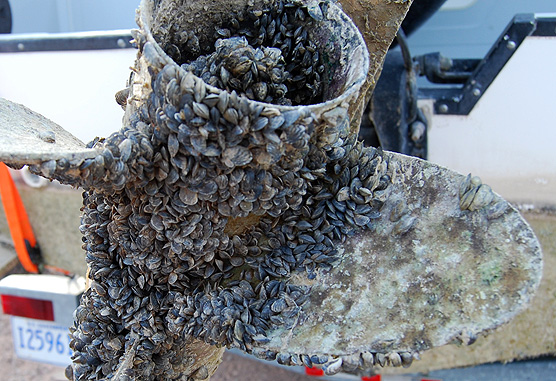CLSS works to prevent mussel invasion at CL
Members of the Christina Lake Stewardship Society (CLSS) and the Boundary Invasive Species Society (BIS) travelled to Dover, Idaho on Wednesday, May 22nd, to learn the appropriate procedures for inspecting boats for Zebra and Quagga mussels.
The objective of this trip was to learn how to keep our lake clean by preventing the spread of Alien Invasive Species (AIS), like these mussels, into BC waterways. This training was offered by Tom Woolf of the Department of Agriculture in Idaho, where boat inspections have been occurring for the last four years. We are behind our American neighbours when it comes to implementation of mandatory boat inspections, but the threat is real.
Last summer a boat that had mussels on it was launched into Shuswap Lake, fortunately subsequent testing by the province of BC indicated the mussels were dead. This was a wakeup call for BC to implement a program to prevent the introduction. Idaho has reported that each year about seven mussel-fouled boats destined for BC are intercepted by inspectors in Idaho, at the training session the group was informed that two fouled boats heading for BC were stopped in Idaho already this spring.
If these mussels were to reach our waterways, there would be serious impacts on property values, water quality, power generation, fisheries, as well as recreation and tourism.
According to the Okanagan Basin Water Boards’ current impact assessment on this species, costs could be $43 million dollars annually for the Okanagan Basin alone. These mussels smell horrible, have razor sharp shells that can cut up feet, and can displace the entire natural food web and watershed environment. They have the ability to clog water intakes and increase maintenance costs for hydro electric dams, and a representative of the US Senate – Joe Heck stated that the bill to prevent Quagga mussels from completely overtaking the Hoover Dam cost the taxpayers of Nevada $1 million per year.
To prevent this from becoming the fate of Christina Lake, it is essential that owners clean all watercraft and equipment thoroughly, drain all standing water, and allow them to dry, especially after being in a water body infested with these mussels.
The message “Clean, Drain, Dry” was present throughout the boat inspection training, as well as the importance of checking every tight, confined space for these creatures since they are able to survive out of water for 30 days.
Wakeboard boats are especially challenging as ballast water containment areas (such as water bladders), that even when drained are hard to get completely dry, and mussels can be inadvertently moved from one body of water to another. The mussels are not present in BC yet, so it is important that all boats from out of province are vigilant in ensuring their boats are clean before launching in our lake.
Members of the CLSS and BIS that received this training will be doing voluntary boat inspections and providing educational information throughout the summer at the Texas Creek Boat Launch. We encourage you to come out and make sure your boat is free of non-native Zebra and Quagga mussels and other invasive aquatic species, including Eurasian Watermilfoil, and Curlyleaf Pondweed, two invasive species that the lake already has that we do not want to spread to other waterbodies.
Come see us at the Texas Creek Boat Launch or visit us at the Christina Lake Welcome Centre and get the information you need to help keep our lake clean!
— submitted by the Christina Lake Stewardship Society






















